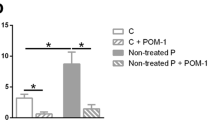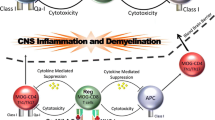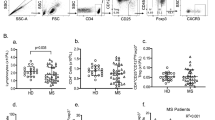Abstract
Experimental animal models for autoimmunity have demonstrated the existence and crucial role of CD4+CD25+ T regulatory (Tr) cells in suppressing autoreactive T cells and promoting peripheral tolerance. Recent in vitro functional studies showed that Tr cells are enriched in the CD25high cell population among CD4+ T cells, and that they totally inhibit proliferation and cytokine secretion by CD4+ T cells. It is not yet known if circulating Tr cells are involved in multiple sclerosis (MS). This study was done firstly to determine whether alterations of the CD4 + CD25high T cells occur in MS, examining their frequencies. As it was reported that the suppressive activity of CD4+CD25+ Tr cells is mainly through cell surface contact pathway, we secondly analyzed the expression of the functionally important cell surface molecules of CD4+CD25high Tr cells. Two- or three-colour flow cytometry was used to identify and quantify CD4+CD25+ Tr cells and CD4+CD25high Tr cells among blood CD4+ T cells in MS patients without treatment vs. patients treated with either interferon-β (IFN-β) or glatiramer acetate (GA) or IFN-β + GA in combination vs. healthy controls (HC). Expression of functionally important surface molecules CD45RO, CD69, CD95, HLA-DR, and intracellular CTLA-4 and IL-10 production by CD4+CD25high Tr cells were investigated. CD4+CD25+ T cells constituted around 6% of CD4+T cells in all MS patient groups, and 7% in HC. There were also no changes in the proportions of CD4+CD25+ Tr cells and CD4+CD25high Tr cells in a longitudinal follow-up of MS patients before and during IFN-β treatment. Frequencies of circulating CD4+CD25highTr cells among CD4+ T cells were also similar and their surface or intracellular molecular expression did not vary in MS patients, irrespective of treatment, compared to HC. This study suggests that levels of circulating CD4+CD25+ Tr cells and CD4+CD25high Tr cells are not altered in MS, and are unaffected by substances currently used to modulate the disease.
Similar content being viewed by others
REFERENCES
McRae BL, Semnani RT, Hayes MP, van Seventer GA: Type I IFNs inhibit human dendritic cell IL-12 production and Th1 cell development. J Immunol 160:4298-304, 1998
Huang YM, Hussien Y, Yarilin D, Xiao BG, Liu YJ, Link H: Interferon-beta induces the development of type 2 dendritic cells. Cytokine 13:264-271, 2001
Vieira PL, de Jong EC, Wierenga EA, Kapsenberg ML, Kalinski P: Development of Th1-inducing capacity in myeloid dendritic cells requires environmental instruction. J Immunol 164:4507-4512, 2000
Hussien Y, Sanna A, Soderstrom M, Link H, Huang YM: Glatiramer acetate and IFN-beta act on dendritic cells in multiple sclerosis. J Neuroimmunol 121:102-110, 2001
Itoh M, Takahashi T, Sakaguchi N, Kuniyasu Y, Shimizu J, Otsuka F, Sakaguchi S: Thymus and autoimmunity: Production of CD25+CD4+ naturally anergic and suppressive T cells as a key function of the thymus in maintaining immunologic self-tolerance. J Immunol 162:5317-5326, 1999
Stephens LA, Mason D: CD25 is a marker for CD4+ thymocytes that prevent autoimmune diabetes in rats, but peripheral T cells with this function are found in both CD25+ and CD25- subpopulations. J Immunol 165:3105-3110, 2000
Sakaguchi S, Sakaguchi N, Asano M, Itoh M, Toda M: Immunologic self-tolerance maintained by activated T cells expressing IL-2 receptor alpha-chains (CD25). Breakdown of a single mechanism of self-tolerance causes various autoimmune diseases. J Immunol 155:1151-1164, 1995
Jonuleit H, Edgar S, Michael S, Andrea T, Jurgen K, Alexander HE: Identification and functional characterization of human CD4+CD25+ T cells with regulatory properties isolated from peripheral blood. J. Exp. Med 193:1285-1294, 2001
Ng WF, Duggan PJ, Ponchel F, Matarese G, Lombardi G, Edwards AD, Isaacs JD, Lechler RI: Human CD4+CD25+ cells: A naturally occurring population of regulatory T cells. Blood 98:2736-2744, 2001
Levings MK, Sangregorio R, Roncarolo MG: Human CD25(+) CD4(+) T regulatory cells suppress naive and memory T cell proliferation and can be expanded in vitro without loss of function. J Exp Med 193:1295-1302, 2001
Asseman C, Mauze S, Leach MW, Coffman RL, Powrie F: An essential role for interleukin 10 in the function of regulatory T cells that inhibit intestinal inflammation. J Exp Med 190:995-1004, 1999
Annunziato F, Cosmi L, Liotta F, Lazzeri E, Manetti R, Vanini V, Romagnani P, Maggi E, Romagnani S: Phenotype, localization, and mechanism of suppression of CD4(+)CD25(+) human thymocytes. J Exp Med 196:379-387, 2002
Dieckmann D, Plottner H, Berchtold S, Berger T, Schuler G: Ex vivo isolation and characterization of CD4(+)CD25(+) T cells with regulatory properties from human blood. J Exp Med 193:1303-1310, 2001
Shevach EM: CD4+CD25+ suppressor T cells: More questions than answers. Nat Rev Immunol 2:389-400, 2002
Baecher-Allan C, Brown JA, Freeman GJ, Hafler DA: CD4+CD25high regulatory cells in human peripheral blood. J Immunol 167:1245-1253, 2001
Thornton AM, Shevach, EM: CD4+CD25+ immunoregulatory T cells suppress polyclonal T cell activation in vitro by inhibiting interleukin 2 production. J Exp Med 188:287-296, 1998
Poser CM, Paty DW, Scheinberg L, McDonald WI, Davis FA, Ebers GC, Johnson KP, Sibley WA, Silberberg DH, Tourtellotte WW: New diagnostic criteria for multiple sclerosis: Guidelines for research protocols. Ann Neurol 13:227-231, 1983
Kurtzke JF: Rating neurologic impairment in multiple sclerosis: An expanded disability scale. Neurology 33:1444-1452, 1983
Bardos T, Czipri M, Vermes C, Finnegan A, Mikecz K, Zhang J: CD4+CD25+ immunoregulatory T cells may not be involved in controlling autoimmune arthritis. Arthritis Res Ther 5:106-113, 2003
Cao D, Malmstrom V, Baecher-Allan C, Hafler D, Klareskog L, Trollmo C: Isolation and functional characterization of regulatory CD25 bright CD4+ T cells from the target organ of patients with rheumatoid arthritis. Eur J Immunol 33:215-223, 2003
Kohm AP, Carpentier PA, Anger HA, Miller SD: CD4+CD25+ regulatory T cells suppress antigen-specific autoreactive immune responses and central nervous system inflammation during active experimental autoimmune encephalomyelitis. J Immunol 169:4712-4716, 2002
Author information
Authors and Affiliations
Rights and permissions
About this article
Cite this article
Putheti, P., Pettersson, A., Soderstrom, M. et al. Circulating CD4+CD25+ T Regulatory Cells Are Not Altered in Multiple Sclerosis and Unaffected by Disease-Modulating Drugs. J Clin Immunol 24, 155–161 (2004). https://doi.org/10.1023/B:JOCI.0000019780.93817.82
Issue Date:
DOI: https://doi.org/10.1023/B:JOCI.0000019780.93817.82




